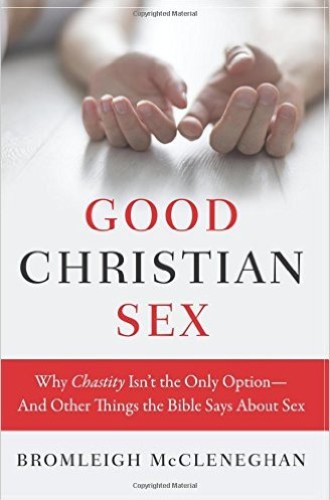Purity, consent, and other lenses on sexual ethics
Sex is complicated. So is Christian reflection on it.
I teach at a religious college in a small town littered with hormonal 20-year-olds. If you turn off your headphones while working in a local coffee shop, you will almost inevitably hear discussions about sex. More likely, you will hear talk of sexual ethics and the spiritual life. Less tale of conquest, more caffeinated conversation about how to draw boundaries. I say this without any condescension. These are my people. I know their questions as important and their angst understandable. How one holds together a life of flesh and a life of spirit does not always feel straightforward.
But as Bromleigh McCleneghan makes clear in her compelling addition to the conversation, she believes these students, and the church more broadly, are thinking about sexuality in an entirely wrong way.
The church universal . . . can be so entirely goofy on topics of sex, love, and relationships. Sex is a critical part of identity (but only if you are straight, and fit traditional gender roles, and are married). Singleness is great and easy to bear and a virtue, and celibacy is expected; but whoa, man, does God want you to get married and enjoy the marital bed (which is both joy and obligation!) and start cranking out some Christian babies who will complete your life and give you purpose.
Read our latest issue or browse back issues.
The publisher calls the book “measured and nonjudgmental.” But this description fails to underscore how uniquely McCleneghan frames the complex issue. Where the church’s singular focus is often around maintaining purity, and where popular culture emphasizes the complex dance of sexual freedom and sexual consent, McCleneghan brings a multiplicity of lenses, joined together with humor and grace. Her refreshing voice is that of a fellow traveler with a wide theological vocabulary.
McCleneghan begins with her own Old Testament–like intellectual genealogy. “I heard about Jesus and Paul and Abraham and Sarah and Mary and John and Peter. I heard about John Wesley and Søren Kierkegaard, Paul Tillich and Reinhold Niebuhr, Martin Luther King Jr., and Phyllis Trible and Peter Berger (and his A Rumor of Angels). I learned the stories and the songs of the faith.” But missing from her theological heritage was any sort of comprehensive understanding of human sexuality.
For McCleneghan, the route to a better understanding is found by extending one’s theological and theoretical lineage. She takes up this task by drawing from feminist theory, contemporary psychology and sociology, pop culture, and theologians like Rowan Williams and Margaret Farley.
The thesis that emerges from this extended conversation is that sex is complex, capable of both destruction and grace. And the models Christians use to understand sex and our role in it can be part of this destruction. Consider the following litany of frameworks. “Married sex is good”—just don’t talk to that woman who ineffectively uses sex as a way to appease a husband in a loveless marriage. “Sexual desire, even when not acted on, is bad”—just don’t mention that to the person whose efforts to reconcile moral teaching and natural impulse have led to self-hatred. Good Christian Sex makes the point that the frameworks by which we deal with this complexity—often the tools that help us reduce risk—have emotional and relational consequences. They shape our ability to relate to ourselves and others, and that is a theological problem. McCleneghan helpfully reminds readers that “Christian life is less about protecting ourselves from being profaned and more about learning to risk ourselves in love.”
The book is at its strongest when it teases out the psychological challenges of the way the church thinks about sex. McCleneghan traces how the church and culture have framed virginity, noting that our culture prizes the trait in women while shaming the same in men (40-Year-Old Virgin, anyone?). But in framing an alternative, the church can get turned around as well. Christians often interpret virginity within a transactional economic space. McCleneghan asks us to think about what happens when sexual intimacy is primarily framed as a loss—of virginity in particular—and when sexual decisions are understood as the “sacrifice of her purity in order to get affection and love.”
It’s one thing to suggest how the church misconstrues sexuality, but it’s an altogether more difficult task to come up with an alternative. Here McCleneghan seeks to offer a sexual ethic that fits comfortably within a progressive theological understanding. Throughout the book she argues that the church should understand sexuality as ethical when it is mutually pursued for the purposes of “pleasure, grace, or intimacy,” even while acknowledging this is often not the case. At other points, she argues for a focus on “mutuality, reciprocity, and love.”
Many readers will regard McCleneghan’s conclusions as nontraditional. At one point she writes, “I remain unconvinced . . . that God is clear about what is right in every circumstance regarding our sexuality.” At another point, she posits, “I’d argue that we can be chaste—faithful—in unmarried sexual relationships if we exercise restraint: if we refrain from having sex that isn’t mutually pleasurable and affirming, that doesn’t respect the autonomy and sacred worth of ourselves and our partners.” She argues that these kinds of relationships should not be immediately discredited in that they still provide a space to grow in the body’s grace, to use the language of one of Williams’s essays.
I anticipate that this is where many conservative critics will take McCleneghan to task. But this is also where the book is most helpful, regardless of whether you agree with her final interpretation. We need a multiplicity of frameworks for thinking through human relationships.
In his essay “Against Self-Criticism,” the British psychotherapist Adam Phillips writes: “You can only understand anything that matters—dreams, neurotic symptoms, literature—by overinterpreting it; by seeing it from different aspects as the product of multiple impulses.” Good Christian Sex does exactly this. It asks theologically conservative Christians to think of sexuality more broadly than maintaining purity. It asks those of a more liberal bent to remember that the sexual encounter is a holy moment that should be approached beyond frameworks of liberation and consent. If the sexual encounter is a communal act with both vertical (human-divine) and horizontal (human-human) dimensions, we will all benefit from frameworks that open up this complexity.
This is not to say that the book is without limitations. The social scientist in me wants to know more about the survey McCleneghan ran and references throughout the book. Who are these people and which of their insights move beyond anecdote? The book also wiggles around the relevance of consent as a guiding framework. At times McCleneghan seems to argue that this is enough, a conclusion that is unfortunate given that one of the central values of her book is to provide a multiplicity of lenses.
The book would have been stronger if it had examined consent though the lens of self-deception. While the author rightly suggests that questioning someone else’s consent can be paternalistic, at other points she acknowledges that a young adult may not understand what kinds of relationships offer space for pleasure, grace, and intimacy. A theologically informed text on sexuality needs to wrestle with our incredible ability for self-deception, a human characteristic with considerable theological and social-psychological support. If sex has the emotional power to move bodies first, and minds into justification after the fact, then we should consider when and why the mind’s consent is legitimate. Throughout the book, I kept wondering what McCleneghan would have to say about these questions.
But the fact that I found myself wondering what she would say indicates that her voice is compelling, her insights needed. Ultimately I stand with Phillips: we can only understand the complexity of human relationships, sexual and otherwise, by exploring with a variety of lenses. Good Christian Sex starts this task and leaves us with the challenge of discerning next steps. McCleneghan sits alongside us, holding our hand, offering a shoulder, and asking how it looks to live out our theology in flesh and blood.







